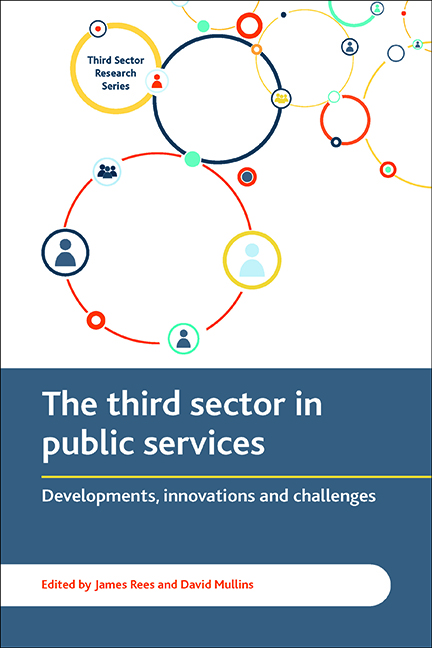Book contents
- Frontmatter
- Contents
- List of tables, figures and boxes
- Series editor’s foreword
- Notes on contributors
- one The third sector delivering public services: setting out the terrain
- Part One Policy, politics and organisations
- Part Two Cross-cutting issue for third sector service delivery
- Part Three Service delivery in key policy fields
- Index
three - The context for service delivery: third sector, state and market relationships 1997–2015
Published online by Cambridge University Press: 05 April 2022
- Frontmatter
- Contents
- List of tables, figures and boxes
- Series editor’s foreword
- Notes on contributors
- one The third sector delivering public services: setting out the terrain
- Part One Policy, politics and organisations
- Part Two Cross-cutting issue for third sector service delivery
- Part Three Service delivery in key policy fields
- Index
Summary
This chapter picks up where the last chapter left off, covering in greater detail the New Labour (1997–2010) and Coalition government periods, up to and including the 2015 general election. It has two broad aims: to provide a historical overview of policy, practice and the academic debates that have surrounded the often controversial role of the third sector in public service delivery; and to tease out underlying continuities and points of difference in the stances of these governments towards the sector, as well as resulting changes within the sector itself. Our analysis is framed by the welfare triangle developed by Adalbert Evers. While shifts in discourse and practice are detected, our examination identifies an underlying continuation of trajectories initiated in the early 1980s including movement towards increasingly market-based forms of provision, the reduction of the scale of the welfare state and an aspiration to harness the perceived positive contribution of the third sector.
These broad trends reflect Tony Blair and Gordon Brown's acceptance of the Thatcher legacy within their Third Way governing project, and were echoed by David Cameron's Big Society rhetoric and George Osborne's drive to further shrink the state in a new era of austerity. Nevertheless, while New Labour did not confront underlying neoliberalising forces in the way that some of their supporters may have hoped, there were significant practical differences in the way in which they dealt with the third sector, not least through the generous funding and capacity building programmes outlined in the previous chapter. These in no small way contributed to the reshaping of significant parts of the third sector, and as a result, components of the policy and practice landscape have been transformed almost beyond recognition from their pre-1997 state, in many cases, along the lines that researchers had predicted (see for example Harris and Rochester, 2001). The financial crisis of 2007–08 and the deficit reduction and austerity measures introduced since then have seen the flow of government funding to the third sector significantly reduced. Although these cuts have been presented by politicians as an economic imperative, they also correspond quite comfortably with the Big Society agenda's emphasis on the role of volunteers in meeting social needs.
- Type
- Chapter
- Information
- The Third Sector Delivering Public ServicesDevelopments, Innovations and Challenges, pp. 41 - 62Publisher: Bristol University PressPrint publication year: 2016



